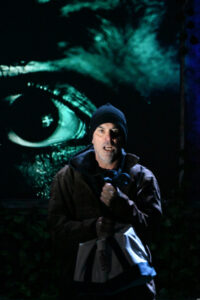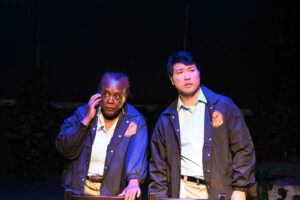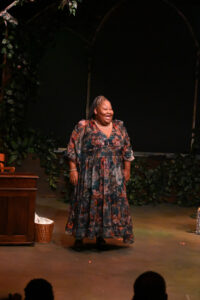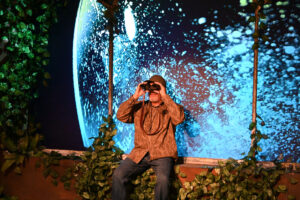The Boiling: A Tale of American Nihilism
Sunhui Chang
Magic Theatre in Association with Campo Santo

At the very beginning of the COVID-19 pandemic, playwright Sunhui Chang heard on a local Seattle newscast how two potentially infected individuals had voluntarily checked into a quarantine motel, only for one to be caught later on a surveillance camera walking out and getting on a bus for destinations unknown, never to be heard of again. Chang’s self-reported eeriness of that news led to his writing the first sentence of what became the current, world premiere play at Magic Theatre (in association with Campo Santo), The Boiling: A Tale of American Nihilism. That initial sentence sets the scene for a gripping, cross-nation search for a dying man leaving a trail of crime victims and deadly infections as he makes his fever-crazed way to the graveyard holding his family history:
“Carrier X stepped out of the tightness of his room and breathed deeply the soft, drizzle of the Pacific Northwest to cool his body from the growing fever.”

An unlikely pair of “trackers” are assigned to find and stop the death-inducing journey of the man known only as Carrier X — a man infected with an incredibly virulent virus known as “the boiling” that quickly leaves its victims desperately gasping for their last breaths. Vee Chisholm (Edris Cooper-Anifowoshe) is a fifty-something, Black, private investigator — a former Marine, with a troubled past of alcoholism, marriage issues, and a forced discharge as a police office. Brian Wheeler (John Brougher) is a mid-thirties Korean-American virologist, adopted by loving white parents now passed away, leaving him a bit rootless.
Vee’s raspy voice spits out four-letter words, blunt assessments, and biting wit with full abound. Brian is more low-key in expression and emotion with a love for plain yogurt. Vee’s rough past has driven her son, Cee (Jesse Vaughn), out of her life for the past several years, and sent her daughter, “D”(Makaila Dyson), to join the Marines, where she is now stationed on the other side of the country from Vee in South Carolina. But together, Vee and Brian are now a close-knit team of two on a mission to track down and immobilize Carrier X (a creepy and violent Lawrence Radecker), who is on a route heading cross-country to the east.

Sunhui Chang’s tale is anything but a straight-forward search-and-find story. Intertwined into the unraveling of clues to find the whereabouts of Carrier X are stories of a family’s history of crimes and sins, a community’s past of violence and racism, a search for personal identity, a sister seeking a brother now lost to her, and even the joys of birding. Histories and traditions both personal and geographic, both enriching and damning are interlaced in a story that skips back and forth in timeline and location through more than twenty-five scenes. The story unfolds not only through real-time action and dialogue but also by a small-town, South Carolina librarian acting as narrator as she reads from a book and also occasionally sings in her rich, deep voice a gospel hymn or a song about memories (Jeannine Anderson as Miss Lolli).
If all this sounds a bit like a strange mishmash of tales and timelines, to some extent that is true. As Vee and Brian head across the country sharing personal stories while relating latest sitings and horrific crimes of their target, we also see glimpses of Carrier X’s violent madness — crimes induced seemingly by both disease and his own nihilistic views of the world. But we are also often in the presence of perhaps the most interesting character of the play — an old, unnamed Black man in a beautiful forest setting who is intensely focused on sighting a bird through his ever-present binoculars.

In that South Carolina setting where a library’s shelves full of books blend into the trees, vines, and boardwalk of a swampy forest (Carlos-Antonio Aceves, scenic designer) “Birder” meets Cee, Vee’s son who three years prior has made his way to where his family history traces back to slavery times. As Cee traces through the books and microfilms of Miss Lolli’s library for his family’s long and troubled history, he also learns about life from the home-spun wisdom and philosophy of the old Birder (Donald E. Lacy, Jr, in a delightfully mesmerizing performance).

The old man often halts a subject he opens — be it personal or local history — with “But that’s another tale for another time.” That phrase actually can apply to a number of curious scenes that somehow find themselves in this time-and-place-hopping ninety minutes (including a scene between Cee and his dying dad where he cleans up his bedridden dad’s accident or a scene between younger siblings Cee and “D” as he shows her how to fold paper into a hopping frog).
Ellen Sebastian Chang’s direction certainly is full of imaginative twists and makes full use of the intimate Magic setting, including aisles. But at times, the Magic’s four columns unfortunately hide a side scene from certain seats (at least from where I happened to be sitting).
Even with all the many switches of time, place, and scene, at times the pace of dialogue slows with no rhyme or reason. To help us as audience to know where and when we are, the director makes use of projections splashed on the setting’s floor; but again for at least from some vantage points, those are at times difficult to see clearly. More successful are the center-of-stage videos and projections designed by Joan Osato where we see everything from scenes of birds in flight to a dying virus victim to the scene of an elevator’s doors opening to a crime in action.
One further directorial decision that seemed more distracting than effective was to have the two trackers’ backs to the audience in a rather long scene where they are in a car heading cross country. Their voices are strangely miked through speakers, and there is a camera person moving around often between them and us as audience, taking close-ups of their faces to be projected on a temporary screen.
All told in the end, it just seems there are too many plot and creative-element ingredients packed into this stew of events, histories, personal revelations, and family reconciliations — many of which are intriguing but many of which are given too short a shrift to grab our full interest and emotions. While there is a definite climax where a singing and narrating librarian, an old birder, a long-separated family of three, two unlikely trackers, and a sick and vicious manic all come together in a closing scene, it feels a bit forced and ho-hum, especially in the dying scene of Carrier X when all threats of an infective, deadly virus seem to be tossed out of the script.
But that does not mean that this world premiere does not have promise in its future and it certainly does not mean that Magic Theatre and Campo Santo should not be commended for shepherding and staging Sunhui Chang’s The Boiling: A Tale of American Nihilism. There are many rich kernels perhaps to be reseeded and germinated in the future into tale a bit less complicated and jerky; and the efforts of the talented cast and creative team are certainly worth being seen by audiences who appreciate and applaud the reward and the risk of world premieres.
Rating: 3 E
The Boiling: A Tale of American Nihilism continues through April 20, 2025, in a ninety-minute (no intermission) world premiere by Magic Theatre in Association with Campo Santo at 2 Marina Blvd., Landmark Building D, 3rd Floor. Tickets are available online at https://magictheatre.org/, by email at boxoffice@magictheatre.org, or by phone at 415-441-8822.
Photo Credits: Jay Yamada

Leave a Reply